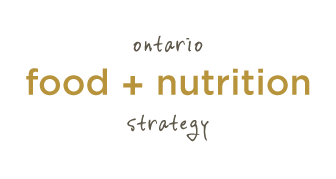Why a Strategy? Why Now?
Ontario’s food system is in crisis, but also can provide solutions for many of the challenges facing our province today. Farmers are not able to make an adequate income farming, while eaters aren’t able to access the food that they need to be healthy. We have a farm income crisis, an obesity crisis, a chronic disease crisis, and challenges in the food-processing sector. At the same time, food and farming is the single largest employer in the province with tremendous potential for further expansion and growth, and dietary improvements could end our health crises.
Groups across Ontario are implementing solutions to our food system challenges and are generating many other benefits in addition to economic growth and improved health; benefits like environmental improvements, safer communities, and better education. These groups are ready to scale-up their solutions, and have identified barriers to other solutions that they would like to develop.
Many civil society groups, businesses, and government players agree that with planning and coordination we could not only fix the food system, but help solve many of Ontario’s economic, environmental, and social problems as well. That is the purpose of this strategy.
While the team working on the strategy hopes that it will be adopted fully, in the short-term we will use it to provide guidance to the Ontario Government on current and new initiatives. For example, we encouraged the government to integrate local food recommendations from the strategy into the Local Food Act*. We will also encourage the initiatives resulting from the Healthy Kids Panel* to integrate recommendations related to children and youth. We encourage other groups to similarly use the strategy to help inform other strategies and processes.
*The Local Food Act celebrates, supports and promotes local food.
**The Healthy Kids Panel provided recommendations that have the goal of a 20% reduction of the childhood obesity rate within 5 years.
Related News on the Sustain Ontario Blog
-
NRC Webinar on Marketing to Kids: Introducing Canada’s New Proposed Legislation Bill S-228
The Nutrition Resource Centre (NRC) is hosting a webinar on Bill S-228: An Act to amend the Food and Drug Act (prohibiting direct food and beverage marketing directed at children) on Thursday, October 25, from 12 – 1:30 p.m. The Bill passed its third reading in the House of Commons on September 19, 2018. Next […]
read more -
Nourish Recruiting Healthcare Employees across Canada to Influence Food Purchasing!
Launched just this week, Nourish is an initiative that is developing a two-year leadership development program for innovators shaping the future of food in Canadian healthcare. The Nourish Program According to their website, the national cohort will be supported to increase the role of food in patient care and community well-being. The cohort will be supported by facilitators, mentors, […]
read more -
Can Twitter lead us to water?
Join the Nutrition Resource Centre in partnership with EPODE Canada as they examine the potential for social marketing campaigns to influence human behaviours and to help us make healthier choices like choosing water over sugar-sweetened beverages. The two organizations are hosting Using Social Marketing to Promote Water and Reduce Sugary Drinks webinar on June 9 that promises a […]
read more -
Bruce Grey Food Charter
The Bruce Grey Food Charter continues to seek endorsements after its fall 2015 launch. It was developed by Bruce Grey Poverty Taskforce with open consultation with community members. There are dozens of such local food charters in Ontario addressing critical food policy issues for greater local food security and more vibrant agriculture. The Charter states that it is “a commitment […]
read more -
Save the Date! June 21 DC Moves Forum in Dufferin County
Headwaters Communities in Action and Dufferin County will host the second DC Moves forum on Tuesday, June 21. Executive Directors, program leads, or alternates from human service agencies in Dufferin are invited to participate and provide input. Improving agency collaboration is at the heart of DC Moves, a “made in Dufferin” initiative working to identify opportunities and develop innovative […]
read more -
Advancing an Edible Education: Government Consultation on Experiential Learning
The Government of Ontario has initiated a consultation period seeking comments on the Future of Experiential Learning in Ontario until the end of May 2016, as the Ministry of Education is expanding experiential learning to provide students with a broader range of learning opportunities that are “connected to the community”. To help inform the development of this […]
read more -
Webinar Explores Tax on Sugar-Sweetened Beverages
Will a taxation of sugar-sweetened beverages reduce consumption, and thus improve the health of Canadians? In a May 5 Webinar, Dietitians of Canada discusses its new position paper that recommends an excise tax on such beverages sold in Canada as part of addressing the negative impact of these beverages on health. While the live Nutrition Resource Centre Webinar currently is […]
read more -
2015 Pre-Budget Submissions from Sustain Members and Allies
A collection of public submissions from Sustain Ontario Members and allies.
read more -
Menu Labelling Legislation Re-Introduced
Yesterday, the Ontario government introduced Bill 45, Making Healthier Choices Act, which includes provisions that would require restaurants and food service operations that are part of a chain of 20 or more establishments to post the number of calories (and potentially other nutritional information) for each food item on their menus. This was a key […]
read more -
A labour of love? Debates on anti-poverty in the kitchen, family farmers and food workers
Food writers in this week’s news have been turning their attention to a food system issue that often gets sidelined: labour.
read more
